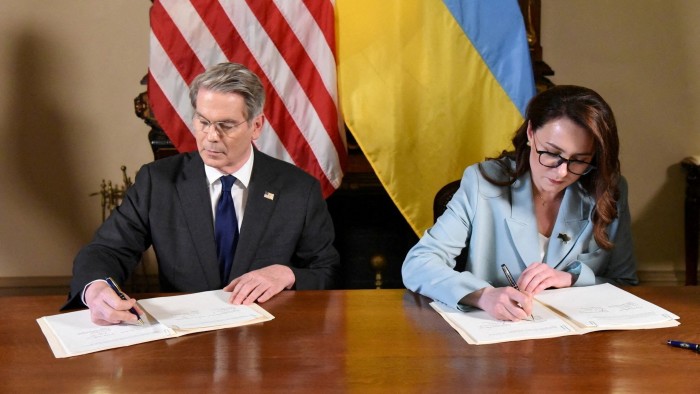The US and Ukraine signed an “economic partnership” deal on Wednesday that will give Washington access to the country’s critical minerals and natural resources, ending weeks of fraught negotiations.
The agreement signed at the US Treasury department will establish a “reconstruction investment fund” for Ukraine that President Donald Trump had insisted on as a way to repay America for aid to Kyiv.
The new deal does not include a previous US demand for retroactive compensation for more than $100bn in military support for Ukraine, terms that President Volodymyr Zelenskyy had consistently refused to accept.
The Ukrainians also succeeded in removing language from the deal that would have complicated negotiations with the EU.
However, they conceded to Washington’s demand that they sign up to more detailed commitments Kyiv had initially insisted were impossible to agree to simultaneously.
While Washington has argued that the deal is necessary for any continued US support, it does not include explicit security guarantees, and Ukraine will be beholden to it regardless of whether a peace deal is secured with Russia.
However, any future US military assistance, such as contributions to Ukraine’s air defences, will be qualified as investment under the terms of the deal.
Trump has been struggling in his effort to broker a Ukrainian-Russian peace deal, which he had pledged to deliver early in his second term as US president.
The minerals deal has been a huge source of tension between Washington and Kyiv.
It was on the cusp of being agreed but was derailed by a high-profile spat in the Oval Office of the White House in February between Trump and Zelenskyy, and only recently were talks put back on track.
Both sides cheered the deal. Scott Bessent, the US Treasury secretary, said in a statement that the US was “committed to helping facilitate the end of this cruel and senseless war”.
He added the deal “signals clearly to Russia that the Trump Administration is committed to a peace process centred on a free, sovereign, and prosperous Ukraine over the long term”.
Ukraine’s first deputy prime minister, Yulia Svyrydenko, celebrated the deal in a post on X, saying: “On behalf of the Government of Ukraine, I signed the Agreement on the Establishment of a United States-Ukraine Reconstruction Investment Fund.
“Together with the United States, we are creating the Fund that will attract global investment into our country.”
Former Russian President Dmitry Medvedev said Trump had finally forced Ukraine to pay for US aid with its natural resources.
“Now they will have to pay for military support with the riches of a disappearing country,” Medvedev wrote on social media app Telegram on Thursday.
The deal was clinched following a meeting between Trump and Zelenskyy at the Vatican last Saturday on the sidelines of the funeral of Pope Francis, and amid rising frustration within the White House at Vladimir Putin, the Russian president.
Even so, eleventh-hour hurdles threatened to halt the agreement, as Washington said Ukraine was walking back some of its previous commitments, just as Svyrydenko was arriving in the US capital.
A person familiar with the US’s thinking in the talks with Ukraine said the final sticking points related to governance, a transparency mechanism and traceability of funds.
Svyrydenko highlighted several key provisions in the deal, which she said ensured full ownership and control over “all resources on our territory and in territorial waters” remained with Ukraine.
Under the agreement, the Ukrainian state determines what natural resources are extracted, with Svyrydenko saying it outlined an “equal partnership”, with the fund “structured on a 50/50 basis”.
The fund will invest in extraction of critical minerals, oil and gas, as well as in related infrastructure and processing, and projects will be jointly selected. For the first decade, all profits generated by the fund will be reinvested in Ukraine.
It “will be jointly managed” with neither side holding a dominant role, a concession Kyiv persuaded Washington to make after it had originally demanded sweeping control over Ukraine’s natural resources.
Svyrydenko said Ukrainian businesses such as oil and gas producer Ukrnafta and nuclear power company Energoatom would stay in state ownership.
The agreement includes no provisions on any Ukrainian debt obligations to the US, and its implementation allowed the countries “to expand their economic potential through equal co-operation and investment”, she added.
After concerns in Kyiv over whether the deal would violate Ukraine’s sovereignty and disrupt its path towards EU membership, Svyrydenko said her negotiators ensured the language complied with her country’s constitution “and maintains Ukraine’s European integration course”.
Read the full article here




